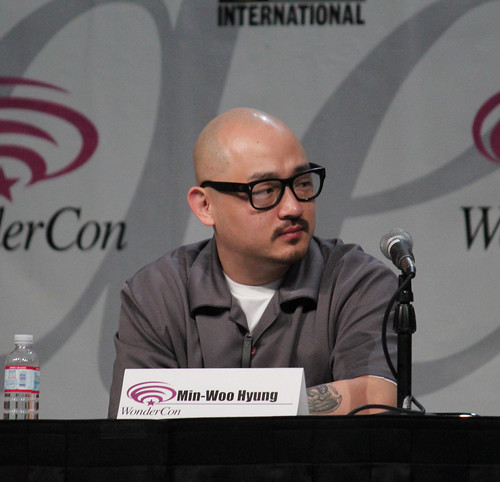In high school, anime and manga was the thing. It was so incredibly popular that our school even offered an art course that focused selectively on anime; the anime club was off its rocker in terms of membership; and to go along with the madness, the television pandered to our obsession with programming like Toonami, which had a listing of DBZ, Sailor Moon, and Gundam Wing. But all of this is beside the point - because the Asian comic book that I was head over heels for was a manhwa, a Korean comic book, that went by the simple name of Priest.
Yes, it was recently made into a film, with a wide cast of stars including Paul Bettany and Lily Collins (who is currently in talks to replace Bruce Campbell's Ash in a remake of Sam Raimi's Evil Dead). For those who are unfamiliar with the manhwa, the film simply looked like another of Paul Bettany's obsession with over the top religious horror films like Legion. To be honest, the film, for me, only amounted to little more than a good popcorn fest and leaned toward being more of an action film than anything scary. On top of that, it seemed to skate along the current trend of undead bloodsuckers, something for which I grilled the director of the film, Scott Stewart, and the creator of the original manhwa, Hyung Min-woo, at the 2011 Wondercon in San Francisco. While they argued against the thought that they were merely embodying the essence of Twilight, I still bemoan the loss of what could have been.
Priest tells the story of Ivan Issacs, a dead, demon-turned priest who seeks to stop the fallen angel Temozarela from completing his domination of humans; mostly this is due to the fact that Ivan let him out in the first place, but also because Ivan's adopted sister and love, Gena, was killed in the resurrection of the angel. Temozarela begins to collect his followers from all over the world, sending them out on missions to kill and mutate humans into zombies as undead armies for his own use. The setting is that of a spaghetti western, Ivan falling classically into the role of a lone ranger, the fallen angels control zombies, Ivan's weapons rival anything a Steampunk cosplayer could come up with - so why did they rely on vampires to see them through?! I will admit, at least the bloodsuckers were an interesting variety that took more cues from naked mole rats than Edward Cullen, but I would have given my right ovary to see the images that Min-woo creates in his comics come to life on the big screen.
The story even moves backward and forward in time, showing Ivan waking up in modern day New York and allowing us to witness Temozarela's fall from Heaven, giving the feeling of an overwhelming and epic story (even expanding through several storylines to show how the fallen angels's touch affect everyone) the true idea that supernatural creatures are outside the limits of space and time. Min-woo cites Mike Mignola's Hellboy as the inspiration for his blocky, gritty art-style, and really, it adds to the absolute horror of his creation. Where Cowboys vs Aliens attempted (and failed) to smash together science fiction and westerns, Min-woo successfully merged westerns, religious myth, zombies, and horror in a way that worked. So, again, why the vampires?
This was the answer that Hyung Min-woo himself gave me, through his translator: the film is set thousands of years after Ivan and Temorazela's story has come to a completion. But the fallen angels left a mark on humanity - anyone touched by the demons was infected, and after several generations, the human population split. One half remained human, while the others mutated into what was easily called a vampire. The film still somewhat maintains the western feel of the comics, with the Steampunk touch ratcheted up past elven with motorair bikes and walled off cities that look like they belonged a little more in Blade Runner. The Priests, descendants of Ivan and his followers, have keen abilities that allow them to sense and fight the vampires. And thus we are brought to a future (a possible future?) for the characters set within the comics.
Unfortunately the manhwa seems to have been discontinued - there was talk of it being told over 25 volumes, but it ends at no. 16, which was released in April of 2007. Min-woo has since moved on to another Tokyopop project, so I believe it's safe to say that Ivan's story will, sadly, continue untold.





No comments:
Post a Comment